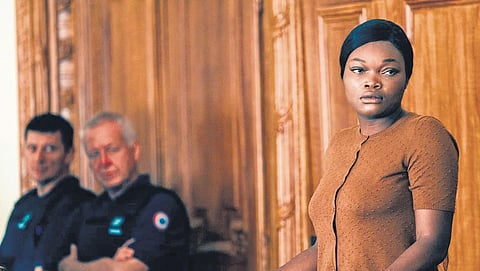

Two of the best films of 2022 premiered at Venice International Film Festival, followed by showings at Toronto International Film Festival. One is Alice Diop’s first narrative feature Saint-Omer which came after several revered documentaries by the filmmaker, and the other is Joanna Hogg’s The Eternal Daughter. The former also won the Silver Lion at Venice.
These two distinctive films share special similarities in the way they use dialogue and sound in addition to the centrality of the relationship they inquire. Both are about mothers and daughters but differ widely in the treatment and the tension in the underlying dynamics between characters. In the former, it is quiet. In the latter, it is spoken.
Saint Omer is about a French-Senegalese novelist Rama (Kayije Kagame), who is working on a new book. She is in a relationship with a white French man, and we learn that she suffers intergenerational trauma sparked by her own troubled relationship with her mother. She is a willing audience to the trial of a Senegalese immigrant in France, Laurence Coly (Guslagie Malanga), an accused of leaving her 15-month-old infant on the beach, the tide acceding to Coly’s idea of killing her daughter. Rama’s new book is based on this trial. But for Rama, the trial is hardly unsentimental. Her roots, her history with her family and her status as an immigrant’s child in France makes her look at Coly in a unique light—compared to the public or the law’s perception—which also gives rise to a form of second-hand guilt. It calls to the question of whose story Rama is working to tell and how their lives conflate and mingle with one another in all their traumatic disarray.
Saint Omer is a chamber drama that’s mostly set in the courthouse with long monologues from lawyers and Coly punctuated by scenes of silence that gaze at Rama in a quizzing, eerie fashion. We catch her looking out of the window during her most vulnerable instances, and creepy choir music accompanies these moments of quiet introspection (there is also Nina Simone at one point).
The Eternal Daughter too is a chamber drama set in a creepy hotel in the wintery British countryside, the building once a mansion of some aristocracy. Julie (Tilda Swinton), a filmmaker, arrives with her mother Rosalind (also Swinton) for a few weeks stay, and Hogg builds the cold atmosphere of a mother and daughter enclosed in a warm bond at odds with the colder blanket surrounding them. None apart from a rude receptionist (who doubles up as the waitress) seems to be present. We also don’t see the two Swintons—mother and daughter—in the same frame except for a lone throwaway shot. All this is to say that Hogg’s film is less about misdirection and more about a confrontation that has led to the personification of grief.
Saint Omer, also about mothers and daughters, is a film about the fear of confrontation—of truth, relationship, life in a foreign land, and the complex equations of motherhood.
Diop and Hogg thrive in the atmosphere they build—the claustrophobia of a courthouse, the close-ups accompanied by lengthy dialogues that create it and the isolation shared by Rama and Coly. And in the case of The Eternal Daughter, the weather around the hotel, the darkly lit alleyways, the twin bed hotel room and bizarre sounds and appearances. They strangely form companion pieces based on the same relationship but with origins in a different race, different social classes and sharing completely different bonds.